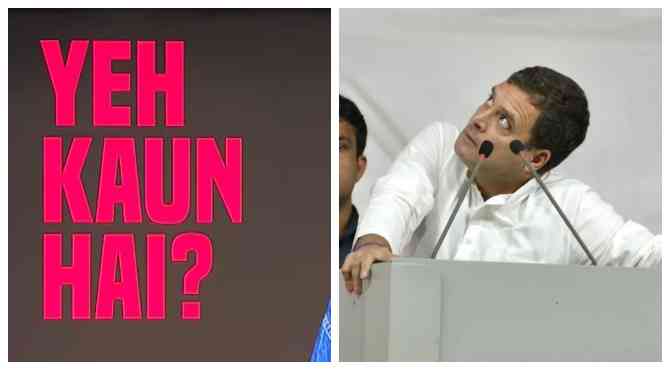Rahul Gandhi’s much-touted “hydrogen bomb” press conference on Haryana elections was marketed as a revelation that would shake Indian democracy to its core. Instead, it turned into a political self-goal, exposing more about the Congress leader’s style of politics than about any alleged electoral wrongdoing. What was announced as an explosion of truth ended up as a cloud of confusion.
Gandhi’s headline claim — That a woman allegedly voted 223 times at two booths—set the tone for what followed — drama without data. A little arithmetic turns the claim on its head. Even if polls lasted 11 hours, that would mean one vote every three minutes. The absurdity of the number shows either a lack of basic fact-checking or a deliberate attempt to sensationalize. Predictably, the internet called it out. The “hydrogen bomb” quickly became a meme, and the laughter took over Rahul Gandhi’s absurd claims.
And yet, Gandhi made that claim about Mulana, a seat Congress actually won. If there truly was vote fraud, did Congress benefit from it? The contradiction was glaring. Instead of shaking the government, the bombshell undermined its own credibility.
For someone who accused BJP of stealing votes, Gandhi came remarkably unarmed. The “evidence” consisted of mismatched voter photos and anecdotal claims, none of which proved that fake voters actually voted or influenced results. The one instance of a BJP sarpanch allegedly having names in two voter lists was overshadowed by the irony that Congress’s own spokesperson, Pawan Khera, had previously been questioned for holding two voter IDs himself.
If even half of Gandhi’s charges were true, courts would have seen immediate action. Yet Congress hasn’t filed a single petition alleging voter list manipulation. The few cases they did file revolve around religious campaigning or postal ballots—routine disputes in any election. So what exactly was this press conference about? Facts? Unlikely. Optics? Most definitely.
The real motive behind this outburst seems less about Haryana and more about Bihar. The timing of Gandhi’s press conference—just before Bihar’s first phase of voting—is no coincidence. Having sensed a strong pro-incumbency wave for the NDA, the Congress leadership appears to have reached for its oldest playbook: sow doubt in the process when confidence on the ground is low.
By crying “rigged election” before the Bihar polls, Gandhi isn’t trying to help correct the system; he’s trying to discredit it. It’s not an exposé—it’s a pre-emptive excuse. If the results in Bihar don’t favor the Congress alliance, the “rigging narrative” will already be in place. It’s a classic case of narrative engineering through victimhood.
One line from the press conference stands out for its irony. Gandhi claimed his team could verify the entire voter list “in two minutes using AI,” while simultaneously complaining that 34 days weren’t enough for review. Which is it? Either his AI is a miracle worker or his math is as shaky as his arguments.
It reflects a pattern that has defined Rahul Gandhi’s politics for years—grand announcements, selective facts, and no accountability. From Rafale to Adani to EVMs, every “revelation” ends the same way: with noise, not results. The “hydrogen bomb” belongs to the same genre of political theater—big intro, no explosion.
There was a time when press conferences like these could dominate the national narrative. Not anymore. The public today demands proof, not performance. Gandhi’s claims collapsed under their own exaggeration before fact-checkers even began. The so-called “hydrogen bomb” revealed nothing about Haryana’s election process but a lot about Congress’s election strategy: dramatize defeat, delegitimize democracy, deflect responsibility.
Rahul Gandhi continues to mistake spectacle for strategy. Every time he promises a political explosion, it ends in a whimper. This time, the only thing that blew up was his credibility—again.
The real story isn’t the alleged “vote theft” but the credibility theft happening within the Congress party itself. When hollow rhetoric replaces evidence, and when conspiracy becomes a campaign, no opposition leader needs enemies; self-destruction becomes inevitable.









